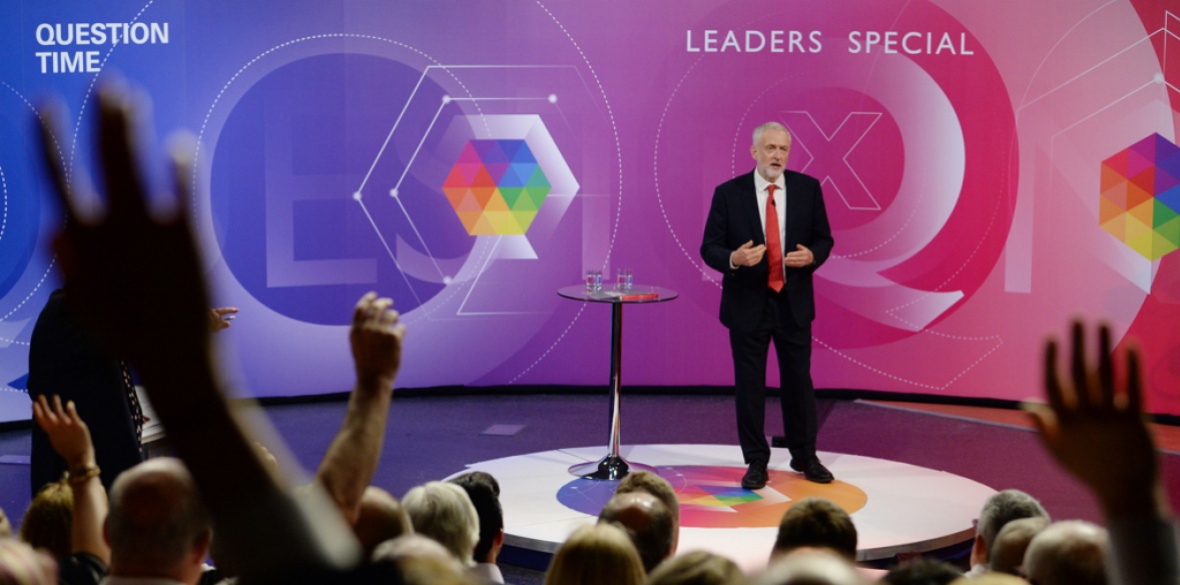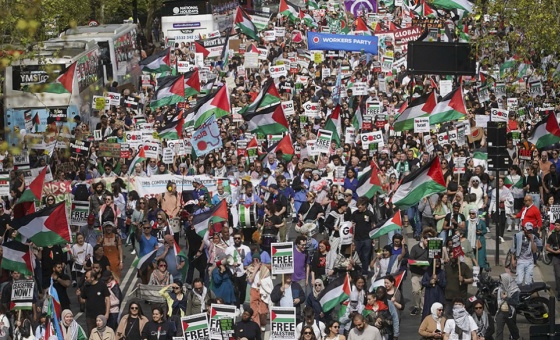This is the last article you can read this month
You can read more article this month
You can read more articles this month
Sorry your limit is up for this month
Reset on:
Please help support the Morning Star by subscribing here
WHEN I accepted the invitation to join the Question Time audience in Derby, I had no actual intention of writing an exposé. However, following the now widely publicised events, I found I was left with no other choice.
For many, it has confirmed long-held suspicions regarding the level of political bias from the BBC. The quite frankly appalling treatment of shadow home secretary Diane Abbott set a dangerous precedent. The failure from the public broadcaster which dominates news and current affairs to be held to account for whipping up a toxic atmosphere which legitimises racism, misogyny and bigotry is completely unacceptable.
To say that the experience was uncomfortable is an understatement, and I would like to take this opportunity to apologise to Diane Abbott on behalf of Derby for the galling treatment and antagonism she received on the show.
The studio audience that – through the actions of Fiona Bruce and the production team, who took it upon themselves to belittle, make inappropriate remarks and undermine Diane Abbott’s long and distinguished career during the warm-up – felt they had been given a free licence to harangue and attack the first black woman to enter Parliament. This was in no way a true reflection of the diverse nature of my home city.
Having previously released a statement in which the broadcaster rejected “claims that any of the panel was treated unfairly” and that they “have contacted her team to reassure them that reports circulating on social media are untrue,” stopping just one step short of calling myself and other eyewitnesses liars, the BBC’s non-apology to the shadow home secretary was simply not good enough and raises further questions about the institution and its accountability as a public service, despite the fact that now it seems an admission has been that “light hearted” remarks were made – vindicating what myself and other eyewitnesses said.
An article from Anne Perkins in the Guardian suggested that Question Time is broken and suggested five ways to fix it. While I agree with some of these short-term proposals, such as fairer chairing, calming the audience down and greater scrutiny over the directing, there is a failure here to tackle the real issues around political bias, racism and misogyny.
Rather than take the softly-softly approach and hope that decency and common sense will prevail, in order to rehabilitate the broadcaster into a truly accountable public service we must go much further.
Following the latest of what in reality is a long line of scandals, it is becoming increasingly clear that the BBC is in dire need of root and branch reform.
Since its inception, the BBC like many other post-war public institutions has been run from a centralised top-down structure.
Highly paid executives have been able to make decisions which ultimately have had an overwhelming impact on setting the mood and narrative of the current and political affairs of our nation.
This is a colossal amount of influence and responsibility, and like so many public services which have been subject to neoliberal reforms, it is now even further away when it comes to being subject to accountability or real scrutiny by the general populace.
An internal market system was introduced at the BBC during a restructuring in the Thatcher era, and this was sold on the common neoliberal fallacy of economic efficiency and competition being good for service.
Stipulations such as 25 per cent of its programming having to come from the private sector were introduced (the production of Question Time itself has indeed been outsourced to a company called Mentorn, now in its second scandal in recent memory, the first being when it transpired that a producer – still employed by the show – had shared posts by far-right group Britain First on social media and sought out and invited members of the neonazi EDL to apply to be in the show’s audience).
Director-general Alasdair Milne was forced to resign after sustained pressure from the government following a number of controversial editorial decisions, reaching fever pitch in 1985 with interviews of Martin McGuinness of Sinn Fein and Gregory Campbell of the Democratic Unionists – directly defying Thatcher who earlier that year had stated that broadcasters should starve “terrorists” of “the oxygen of publicity” – and was replaced with the much less progressive Michael Checkland, an accountant far less likely to ruffle feathers and challenge the government.
An exodus of talented and radical social-realist producers, writers and dramatists such as Dennis Potter and Alan Bleasdale to Channel 4 followed – and with a parallel centralisation of news and current affairs programmes, which curtailed journalistic freedom, the BBC from the late ’80s onwards grew to become the corporation we know today.
Programmes such as Question Time, which are eulogised as great exercises of direct democracy, have now been proven to be anything but. Far from being balanced and neutral, Diane Abbott was interrupted 17 times during the debate compared to Rory Stewart who was interrupted 10 times. The frenzied crowds that now make up the audience create a particularly hostile atmosphere where actual discourse and reasoned debate is lost to reactionary sentiments.
This most recent incident of stage-managed hostility is further evidence of a highly politicised Establishment seeking to set an anti-Labour, anti-Corbyn and most significantly an anti-transformational agenda. This establishment has used racism, bigotry and reactionary sentiment to fuel this narrative, setting an incredibly dangerous precedent.
However, it would now seem that this confirmation of the BBC’s bias against the transformational Labour project, and the flagrant discrimination against Diane Abbott has now become the straw that has broken the camel’s back. The public has shown a righteous outrage and the BBC once again has found itself in crisis.
A petition launched by Momentum calling for the BBC to apologise to Diane Abbott for the bullying and gaslighting witnessed has been signed by nearly 25,000 people and a video circulated by the pressure group has at this point reached 1.4 million views on twitter. The Labour Party has made a formal complaint and has asked for any footage of the show to be released.
Radical change to the way the decision-makers that sit atop the organisation and wield so much influence are appointed is a minimum requirement. At this present moment the government changes and adjusts the BBC’s Charter to suit its needs, as well as directly appointing senior executives to its board.
This is done under the feign of public accountability, and while the BBC insists it is independent from state control, the revolving door of highly politicised figures who occupy these roles – Tony Hall, the current BBC director-general, as well as being a baron was previously an adviser to the Department for Culture, Media and Sport – obviously creates an enormous conflict of interest when faced with the notion of impartiality.
As we have now seen this is a failing model and needs to be abolished, taking away overwhelming government influence and bias and replacing it with a more direct form of democracy.
The BBC’s board should be elected by licence fee payers (an uncostly and potentially simple exercise considering the organisation’s digital signing-in system.) This should be done at regional and national levels and would allow a much-needed democratisation and representational diversity away from governmental influence.
Alongside this, BBC staff and workers from the different sectors should also be allowed to elect representatives to these boards. Giving these workers who create the shows a seat at the table and a real voice in the decision-making process would not only be better in terms of democracy, but would allow more creativity, journalistic freedom and the ability to hold the government truly to account.
This alongside a genuinely robust complaints and scrutiny procedure would ensure we would never have to endure the sorry state of affairs that the public broadcaster has currently found itself in.
This would be a small but much-needed step in the right direction. In an age where multinationals such as News International can control the media and communications – five billionaires own around 80 per cent of the UK media – and in turn set our narratives and shape cultural terms, it is more vital than ever that we ensure that our public broadcaster is truly accountable.
Firstly, however, the BBC simply needs to apologise to Diane Abbott.
Jyoti Wilkinson works for the constituency office of Derby North.









